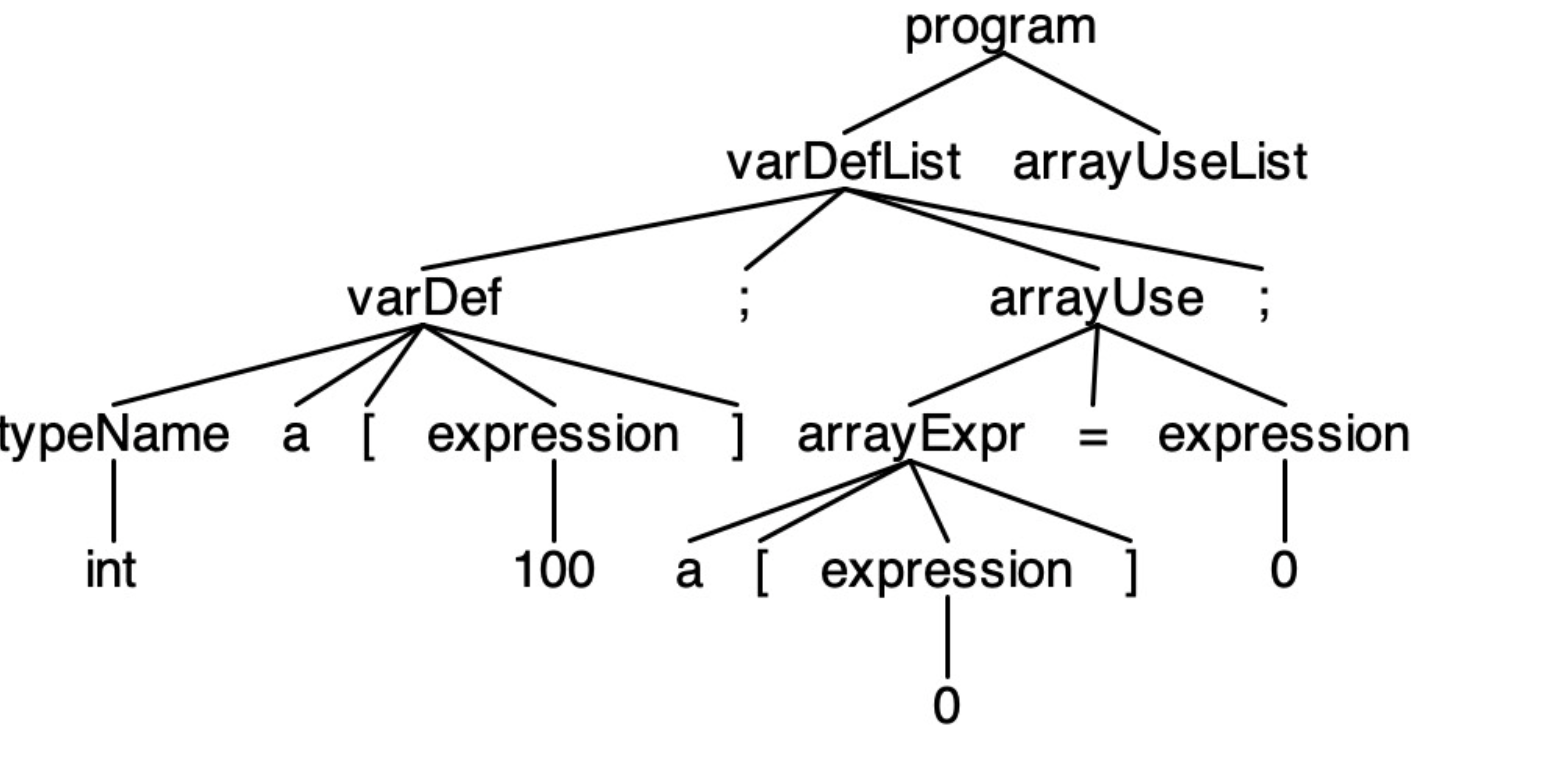1.前言
网络攻防实践先导,听着名字很高大上吧,正如它的名字那般,它的难度也是非常的大: (。作为一门今年新开的课,属于四门先导课程之一(剩下三门分别是软件工程先导、人工智能先导和忘了叫啥先导)。在上学期选课的时候,110人的课,选了139人,可见其火爆程度,也许是网络和攻防这两个要素吸引人,所以这门课的第一个实验——数组越界的检测,与上述两点看起来似乎没有丝毫关系,但是难度还极大,这就造成了,很多人退课(毕竟才0.5学分)。截止至2022年4月1日02点54分,139的课现在还剩39人…….我捏,有幸忝列其中。这足以看出这门课有多难了吧,接下来我给大家分享一下我写这门课的一些心得与体会吧(主要是写给自己看的,要是有不认识我的人看到了这篇博客,算你厉害🤔)
2.实验介绍
实验的要求很简单,编写一个文件checker.cpp,要求实现数组越界的检测。以下是原话:
本次实验自拟了一种类似C语言数组的语法,称为easy C,其仅包含简单的变量声明,算术表达式和数组操作,文件后缀为.ec。本次实验的目的是使用c++语言编写一个检测程序,检测输入的.ec文件中数组使用的索引值是否超过数组定义的最大长度。
看起来,似乎很简单,巴特,然并不。
3.实验分析
由于使用了自定义的easyc语法,所以逻辑上和我们平时的c语言有些许不同,但是还好,easyc简化很多东西,使其变得和Python语法那般简洁。在easyc中,程序执行被分为两部分:变量赋值VarDef(保存在VarDefList) 和 数组引用ArrayUse(保存在ArrayUseList),执行顺序上,先执行完所有变量赋值后,再进行数组引用。我们的任务就是,遍历这两个部分,遍历其中的和数组越界有关的表达式,并判断其是否越界。在存储结构中,变量的定义和数组的引用大量的用到了树结构,如下图:


上图中VarDefList元素从0开始,长度为3,表示图中从左至右3个变量的定义语句,ArrayUseList元素从0开始,长度为4,表示图中从左至右4个表达式语句。
然后,这个checker文件里面,定义了四种结构体,分别是ArrExpr、Expression、ArrayUse和VarDef,这四个结构体就是整个实验要操作的对象,
ArrExpr结构体定义了数组表达式:
1
2
3
4
5
| struct ArrExpr{
std::string id;
int dimension;
std::vector<struct Expression*> length;
};
|
Expression表达表达式结构:
1
2
3
4
5
6
7
8
| struct Expression{
int grammartype;
std::string id;
std::string op;
struct ArrExpr *arrexpr;
struct Expression* expr;
std::string digitsequence;
};
|
ArrayUse代表数组的使用:
1
2
3
4
5
6
7
| struct ArrayUse{
int grammartype;
struct ArrExpr *arrexpr;
struct Expression *expression;
std::string id;
std::string op;
};
|
VarDef表示变量的定义:
1
2
3
4
5
6
| struct VarDef{
int grammartype;
std::string id;
int dimension;
std::vector<struct Expression*> length;
};
|
这些大概就是题目的信息了,对我们来说,难点有以下这些:
可以看到,这个实验对大一来说真心不友好。寄!
不过还好这个实验是面向41个样例进行的编程,不用考虑过多情况。
4.实验部分代码展示
这个实验最难的部分是实现Expression的计算,因为这个Expression是可以嵌套调用的,所以需要用到栈的知识,这里我选择使用使用递归函数解决,因为所有的表达式,进行拆分,最后的结果只能是:常数,数组的引用 和 变量的引用 三个中的其中一个,所以只要以这三种结果为递归函数的出口,就可以实现EXpression的计算了。
我编写的计算Expression的calc函数:
1
2
3
4
5
6
7
8
9
10
11
12
13
14
15
16
17
18
19
20
21
22
23
24
25
26
27
28
29
30
31
32
33
34
35
36
37
38
39
40
41
42
43
44
45
46
47
48
49
50
51
52
53
54
55
56
57
58
59
60
61
62
63
64
65
66
67
68
69
70
71
| int calc(struct Expression* exp){
if (!checkflag and exp->arrexpr != NULL){
int uselen;
for (int j=0;j<exp->arrexpr->dimension;j++){
uselen = calc(exp->arrexpr->length[j]);
if (uselen < 0 or uselen >= idmap[exp->arrexpr->id + "+" + std::to_string(j+1)]) checkflag = true;
}
}
if (!exp->digitsequence.empty() and exp->op.empty()){
return std::stoi(exp->digitsequence);
}
else if (!exp->id.empty() and exp->op.empty()){
return idmap[exp->id];
}
else if (exp->arrexpr != NULL and exp->op.empty()){
std::string id;
id = exp->arrexpr->id;
for (int j=0; j < exp->arrexpr->dimension ; j++){
id += "_" + std::to_string(calc(exp->arrexpr->length[j]));
}
return idmap[id];
}
else{
if (exp->op == "+"){
if (!exp->digitsequence.empty()) return std::stoi(exp->digitsequence) + calc(exp->expr);
else if (!exp->id.empty()) return idmap[exp->id] + calc(exp->expr);
else{
std::string id;
id = exp->arrexpr->id;
for (int j=0; j < exp->arrexpr->dimension ; j++) {
id += "_" + std::to_string(calc(exp->arrexpr->length[j]));}
return idmap[id] + calc(exp->expr);
}
}
else if (exp->op == "-"){
if (!exp->digitsequence.empty()) return std::stoi(exp->digitsequence) - calc(exp->expr);
else if (!exp->id.empty()) return idmap[exp->id] - calc(exp->expr);
else{
std::string id;
id = exp->arrexpr->id;
for (int j=0; j < exp->arrexpr->dimension ; j++) id += "_" + std::to_string(calc(exp->arrexpr->length[j]));
return idmap[id] - calc(exp->expr);
}
}
else if (exp->op == "*"){
if (!exp->digitsequence.empty()) return std::stoi(exp->digitsequence) * calc(exp->expr);
else if (!exp->id.empty()) return idmap[exp->id] * calc(exp->expr);
else{
std::string id;
id = exp->arrexpr->id;
for (int j=0; j < exp->arrexpr->dimension ; j++) id += "_" + std::to_string(calc(exp->arrexpr->length[j]));
return idmap[id] * calc(exp->expr);
}
}
else if (exp->op == "/"){
if (!exp->digitsequence.empty()) return std::stoi(exp->digitsequence) / calc(exp->expr);
else if (!exp->id.empty()) return idmap[exp->id] / calc(exp->expr);
else{
std::string id;
id = exp->arrexpr->id;
for (int j=0; j < exp->arrexpr->dimension ; j++) id += "_" + std::to_string(calc(exp->arrexpr->length[j]));
return idmap[id] / calc(exp->expr);
}
}
}
}
|
目前已知的问题:没有考虑算数优先级,所以计算出来的结果不一定正确。
checker函数:
1
2
3
4
5
6
7
8
9
10
11
12
13
14
15
16
17
18
19
20
21
22
23
24
25
26
27
28
29
30
31
32
33
34
35
36
37
38
39
40
41
42
43
44
45
46
47
48
49
50
51
52
53
54
55
56
57
58
59
60
61
| std::map<std::string, int> idmap;
int calc(struct Expression* exp);
bool checkflag = false;
void checker(){
for (int i = 0; i < ArrayUseList.size(); ++i) {
struct ArrayUse* arruse = ArrayUseList[i];
if (arruse->arrexpr == NULL){
idmap[arruse->id] = std::stoi(arruse->expression->digitsequence);
}
}
for (int i = 0; i < VarDefList.size(); ++i) {
struct VarDef *def = VarDefList[i];
std::string id;
if (def->dimension == 0){
continue;
}
for (int j = 0; j < def->dimension;j++){
idmap[def->id + "+" + std::to_string(j+1)] = calc(def->length[j]);
}
}
for (int i = 0; i < ArrayUseList.size(); ++i) {
struct ArrayUse* arruse = ArrayUseList[i];
int uselen = 0;
std::string id;
if (checkflag == true) break;
if (arruse->arrexpr == NULL){
id = arruse->id;
idmap[id] = std::stoi(arruse->expression->digitsequence);
}
else{
id = arruse->arrexpr->id;
for (int j=0;j<arruse->arrexpr->dimension;j++){
uselen = calc(arruse->arrexpr->length[j]);
if (checkflag or uselen < 0 or uselen >= idmap[arruse->arrexpr->id + "+" + std::to_string(j+1)]){
checkflag = true;
break;
}
id += "_" + std::to_string(calc(arruse->arrexpr->length[j]));
}
if (checkflag) break;
idmap[id] = calc(arruse->expression);
}
}
if (checkflag == false){
std::cout<<"Correct"<<std::endl;
}
else std::cout<<"Out of bound"<<std::endl;
}
|
5.心得
好难好难好难好难,当时和好兄弟在形策课上激情讨论,然后也没取得啥实质性进展(当天下午就被封校了,现在距离封校都过去了三周,没有啥解封的迹象,焯!),晚上熬了几个大夜,遇到了一堆奇奇怪怪的bug。最恶心的是,直接编译运行,报错信息只有核心错误,这就导致了我Debug的时间比写代码的时间长得多的多的多。这也让我后来跑去学了学怎么在IDE里边打断点调试(之前我都是Print战士,焯)。总之,这次实验还是让我学到不少好东西的,于是就有了这篇一大堆废话的文章(反正也是我自己看的嘻嘻)。









